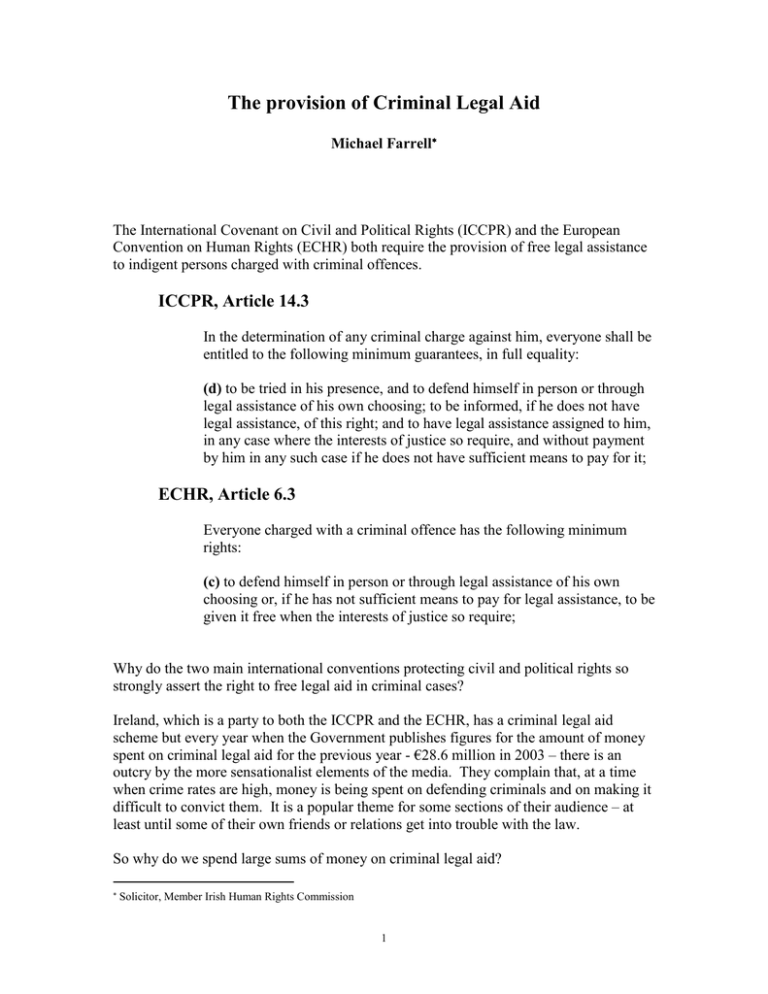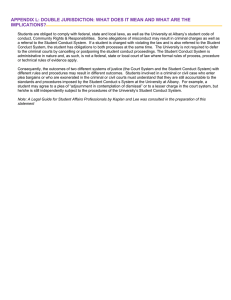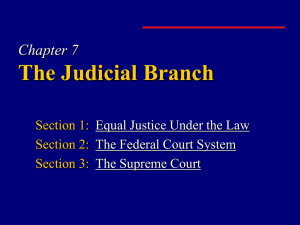michael farrell-eng
advertisement

The provision of Criminal Legal Aid Michael Farrell The International Covenant on Civil and Political Rights (ICCPR) and the European Convention on Human Rights (ECHR) both require the provision of free legal assistance to indigent persons charged with criminal offences. ICCPR, Article 14.3 In the determination of any criminal charge against him, everyone shall be entitled to the following minimum guarantees, in full equality: (d) to be tried in his presence, and to defend himself in person or through legal assistance of his own choosing; to be informed, if he does not have legal assistance, of this right; and to have legal assistance assigned to him, in any case where the interests of justice so require, and without payment by him in any such case if he does not have sufficient means to pay for it; ECHR, Article 6.3 Everyone charged with a criminal offence has the following minimum rights: (c) to defend himself in person or through legal assistance of his own choosing or, if he has not sufficient means to pay for legal assistance, to be given it free when the interests of justice so require; Why do the two main international conventions protecting civil and political rights so strongly assert the right to free legal aid in criminal cases? Ireland, which is a party to both the ICCPR and the ECHR, has a criminal legal aid scheme but every year when the Government publishes figures for the amount of money spent on criminal legal aid for the previous year - €28.6 million in 2003 – there is an outcry by the more sensationalist elements of the media. They complain that, at a time when crime rates are high, money is being spent on defending criminals and on making it difficult to convict them. It is a popular theme for some sections of their audience – at least until some of their own friends or relations get into trouble with the law. So why do we spend large sums of money on criminal legal aid? Solicitor, Member Irish Human Rights Commission 1 The first point to be made, which is a rather obvious one, is that quite a few of the people on whom this money is spent are not criminals and will be acquitted of the charges against them, and that there is a presumption of innocence for all persons coming before the courts. The second point was made very forcibly in the leading case that established that there was a constitutional right to legal aid in Ireland (The (State) Healy v. Donoghue [1976] I.R. 325). This case involved two men who were charged with fairly routine car theft offences and whose lawyers did not appear in court due to an industrial dispute. The judge insisted on dealing with the case in the absence of the lawyers despite the defendants’ protests. The case was appealed to the Irish Supreme Court, which considered it in light of Article 38.1 of the Irish Constitution, which says: “No person shall be tried on any criminal charge save in due course of law”, and the fundamental right to liberty protected by Article 40.4.1 of the Constitution. The then Chief Justice first of all made clear that trial in ‘due course of law’ required that the trial must be fair and the accused person must have an opportunity to defend him/herself. He then set out very firmly the reasons why the ordinary citizen required legal assistance in order to have a fair chance of defending her/himself and went on to say that if the accused did not have the means to pay for legal representation, then if the constitutional right to a fair trial was to mean anything, the State should fund his/her defence. It is worth quoting the judgment at some length: “Where a man’s liberty is at stake, or where he faces a very severe penalty which may affect his livelihood, justice may require more than the application of normal and fair procedures in relation to his trial. Facing, as he does, the power of the State, which is his accuser, the person charged may be unable to defend himself adequately because of ignorance, lack of education, youth or other incapacity. In such circumstances his plight may require, if justice is to be done, that he should have legal assistance. In such circumstances, if he cannot provide such assistance by reason of lack of means, does justice under the Constitution also require that he be aided in his defence? In my view, it does.... “If the right to be represented is now an acknowledged right of an accused person, justice requires something more when, because of lack of means, a person facing a serious criminal charge cannot provide a lawyer for his own defence. In my view the concept of justice under the Constitution ... requires that in such circumstances the person charged must be afforded the opportunity of being represented. “This opportunity must be provided by the State. Only in this way can justice be done, and only by recognising and discharging this duty can the State be said to 2 vindicate the personal rights of the person charged. To hold otherwise would be to tolerate a situation in which the nature and extent of a man’s ability to defend himself, when accused, could depend on the nature and extent of his means; that would be to tolerate injustice.” The fundamental rights and fair trial provisions of the Irish Constitution mirror fairly closely the equivalent provisions of the ICCPR and the ECHR, so the Chief Justice’s reasoning applies just as much to the provisions on legal aid in the international conventions as to the domestic situation in Ireland. The third point in support of publicly funded criminal legal aid is linked to what the Irish Supreme Court said in the Healy v. Donoghue case. For a justice system to work, it must have credibility and have the confidence of the general public. The public must believe that justice will be done in their courts, that only the guilty will be convicted, and that judicial decisions will be made based on the evidence, and not on prejudice, political influence or corruption. If the public do not have confidence in the courts, then they will not cooperate with the police or give information or evidence, lest it might lead to an innocent person being convicted or just because they do not believe that they will get justice if they do. Good legal defence work is essential to ensuring, as far as possible, that justice is done and that the public can have confidence in the outcome of trials in the courts. And such confidence is essential to a functioning democracy where peoples’ energy is devoted to building a just and inclusive society and which can win the confidence and respect of other countries and societies. I feel this particularly strongly as I am originally from Northern Ireland where, at the height of the conflict there, very many in the minority community lost confidence in the courts and justice system, which in turn helped to prolong the conflict. As a result, the administration there has had to work very hard and introduce far-reaching reforms in order to try to rebuild confidence in the justice system. In Ireland (the Republic) there was a recognition from just after the foundation of the state in the early 1920s that legal assistance must be provided for those accused of murder, in particular, because of the gravity of the consequences if a mistake was made when capital punishment was still in existence. -- I am glad to be able to say that capital punishment has not been used in Ireland for 50 years now and was finally and totally abolished in 1990. Legal aid was granted in Ireland in the early years on an ad hoc basis for charges of murder and other very serious offences. Gradually over the years criminal legal aid was extended and in 1962 a Criminal Justice (Legal Aid) Act was passed, although it was still not very comprehensive in its coverage and many poorer people coming before the courts do not seem to have been aware of 3 their entitlement to legal aid. In the Healy v. Donoghue case the Supreme Court also said that courts must tell accused persons that they were entitled to legal aid and the result was that the cost of the legal aid scheme increased five-fold over two years, between 1975 and 1977. Since then, a number of other cases and amendments to the law have clarified the parameters of the legal aid scheme, which is now broadly satisfactory, although there are still a number of areas which have important implications for criminal law that are not covered. And, of course, this scheme does not cover civil matters, which are dealt with under a much less satisfactory scheme. The criminal legal aid system in Ireland is based on State funding of private legal practitioners to represent persons accused of offences. There is a means test but legal aid is generally made available to persons who are unemployed or in receipt of social welfare benefits or on low wages – which are of course still fairly high by Chinese standards. There is no formal upper limit above which someone will not be eligible for criminal legal aid but the upper income level for civil legal aid, which is €13,000 per annum, provides an indicator of how the courts will view applications. Legal aid is provided only for offences that may incur a custodial penalty, though the court no longer makes a decision as to whether such a sentence is likely to be imposed in the particular case before granting a legal aid certificate. Legal aid usually provides for only one lawyer, a solicitor, to appear in the lowest court, the District Court, which has an upper limit in terms of penalty of two years imprisonment. In the higher courts, legal aid will also provide for one or more barristers – who specialise in court advocacy. It will also cover the cost of engaging professional witnesses, e.g. medical practitioners, forensic scientists etc., where necessary. It also covers appeals against conviction and/or sentence. Lawyers willing to do criminal defence work are placed on a panel and an accused person can choose from the panel members, although s/he does not have an absolute right to have the lawyer of his/her choice. The court appoints the legal representative from the panel but would only interfere with the accused’s choice in very exceptional circumstances, such as a clear abuse of the system. Not all lawyers, incidentally, are willing to serve on the legal aid panel as criminal defence work is not nearly as lucrative as e.g. commercial legal work, and is regarded, rightly in my view, as difficult and stressful. In the last five years, the legal aid scheme has been extended to lawyers visiting and advising clients detained for questioning by the police, which is something for which lawyers had been pressing for many years. Prior to that, lawyers had often been reluctant to visit clients in police stations when it took them away from the courts or their offices for significant amounts of time and was unpaid. And yet the period of police questioning is one of the points at which legal advice is most needed by the client. 4 The scheme still does not cover bail hearings, habeas corpus applications or judicial review, which is the main way in our system of challenging the constitutionality of statutes and the legality of administrative actions. There is financial assistance for this type of work but it is based on a non-statutory scheme, called the Attorney General’s Scheme, which is poorly paid when compared with other legal work of similar intensity and complexity. The result, which some lawyers feel is deliberate, is to discourage to some degree innovative legal challenges to executive actions. There has been some consideration of the introduction of a public defender scheme in Ireland, driven mainly by cost-cutting concerns, but most lawyers are opposed to it. Some of the opposition is, of course, self-interested, based on a fear that it would reduce earnings, but there is also a concern, based on looking at the US experience, that such a scheme would be under-funded and under-resourced and would thus provide a poorer service to clients. One of the principal grounds of appeal in death sentence cases in the US in recent years has been claims of inadequate and incompetent legal representation at trial under the public defender scheme. I should, of course, also say that there are some really excellent public defender lawyers in the US who do great work under very difficult conditions. There is also some concern that in a state-run system, promotion and advancement would not go to those who showed the most enthusiasm for defending their clients, thus gradually making the system less effective. Neither of these concerns is insurmountable. A well-funded public defender system established on a totally independent basis could be just as effective as our present system. And in fact we have some publicly funded bodies that provide legal representation in equality law cases and to asylum-seekers that have shown their independence over the years, but the gross under-funding of the Government-financed (Civil) Law Centres would not encourage one to think that adequate resources would be put into a public defender scheme. Legal costs, of course, do not have to be as high as they are in Ireland, but if criminal defence work is to attract and keep well-qualified and experienced practitioners, the fees paid must be in some way comparable with what such practitioners could earn in other areas of law in the particular country in question. If criminal legal aid is essential to the integrity of the justice system and the protection of the rights of accused persons, as the Irish Supreme Court said in Healy v. Donoghue in 1976, then it is important in each country to ensure that it is not a second rate service or that will tend to undermine confidence in the whole justice system. 5




